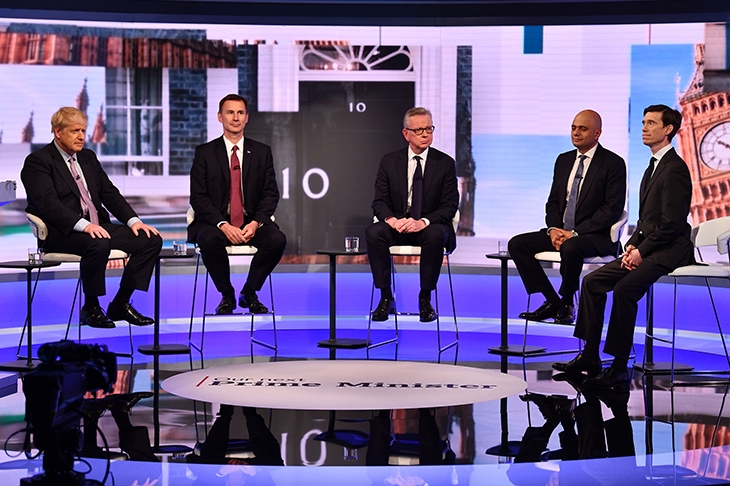Boris and his team made a mistake by agreeing to take part in Tuesday’s BBC leadership debate. In such decisions, candidates must be absolutely ruthless. It does not matter whether one is accused of ‘running away’ if one does not take part. The only question is, ‘Will going on X improve the candidate’s chances with the relevant electorate?’ The relevant electorate in the Tory leadership campaign is 1. MPs and 2. party members. Nobody else matters, except inasmuch as wider opinions affect those who vote. Boris could easily have reached MPs without going on the BBC debate. He can less easily reach party members, but even then, he can find more suitable platforms later. When Mrs Thatcher was leader of the opposition, she was eager to debate on television with Jim Callaghan, the Labour prime minister. Gordon Reece, her spin doctor, was adamantly against it, on the grounds that ‘The dragon in shallow water is the sport of shrimps.’ She did not, in the end, go on. Boris made himself the sport of shrimps on Tuesday. He survived, but derived no benefit.
Behind Boris’s decision to appear was a mistaken cringe to the ‘mainstream media’ (MSM). The success of Donald Trump shows that the insurgent, anti-establishment candidate (which Boris is) must not defer in any way to the MSM. He must appear on their programmes only if he can ensure clear advantage, and he must never accept the agenda behind their programmes. He must communicate by other means, building sympathy with the ever-growing electorate which dislikes the MSM. By deploying silence, he seems bigger and deeper than if he talks too much. If he does speak, he flatters his electorate by addressing them narrowcast rather than broadcast.
As Boris’s team should have predicted, the BBC, via Emily Maitlis, attacked Boris throughout. So did its coverage the following morning. ‘Words are actions,’ said Nick Robinson on Today, sententiously editorialising. ‘Again and again Boris Johnson gets his words wrong.’ Up duly pop Nazanin Zaghari-Ratcliffe’s husband, Heathrow airport expansion and the precise wording of the promise to leave on 31 October — all licensed to do so by the weak decision to let Boris go on.
Such debates are structured against Conservatives and conservatism. The actual electorate in this contest will not instinctively defer to a 15-year-old schoolgirl from Glasgow who tells us we should condemn this country to extreme and pointless poverty by achieving ‘zero-carbon’ by 2025. But the ‘optics’ of the programme made it impossible for the candidates to say that. Instead they all grovelled to the poor, indoctrinated, non-voting child, each striving to seem greener than the other.
Similarly, when confronted by Abdullah Patel, the mufti from Bristol, the candidates were in no position to know whether he is a moderate Muslim or one of the not insignificant number who denounce Jews, want women covered up etc. So when Mufti Patel complained of Islamophobia, Sajid Javid, who, I know for a fact, is extremely suspicious of the very concept, proposed an independent inquiry into the alleged problem in the Tory party. All the other candidates — including Michael Gove, who utterly opposes the idea — cravenly agreed. Mr Javid thus lost the chance to mark himself out as the proud, integrated Muslim citizen of this country not chained by grievance politics that he actually is. If he had seized the moment to say this, he would have improved his chances of reaching the final run-off, but he didn’t dare, because of the fundamentally hostile environment of the BBC. The next morning, clever old Guido Fawkes found tweets from Mufti Patel — a retweet which wants to relocate Israel to the middle of the United States and a tweet which complains that ‘Every political figure on the Zionist’s [sic] payroll is scaring the world about Corbyn’. So the anti-Islamophobe is also an anti-Semite. By then, of course, the damage had been done.
All the men sat around in black suits, looking like off-set actors in Reservoir Dogs. Poor Rory Stewart tried to attract attention by tearing his tie off, but such was the constraint of the format that he would have stolen the show only if he had removed his trousers as well. Although he marked himself out as distinctive, he did not cut through, like Nick Clegg in the famous general election debate of 2010. His opponents did not suddenly find themselves forced to say, ‘I agree with Rory.’ Why was this? I think because one can intuit that Mr Stewart’s underlying message is Remain, but he cannot quite say it. Why else would he want to concoct a Citizens’ Assembly to re-frame the question which the 2016 referendum answered on a colossal scale? His world-view is essentially late-imperial Foreign Office pessimism. We have had enough of that.
Boris is understandably against the idea that the last two in the fight should both be Etonians. As I write, his fear is unlikely to be fulfilled. If such a contest did take place, the wider world would perceive it as a stitch-up within the ruling elite. Actually, it would be much more of a grudge match than would a fight between men of very different backgrounds, such as Johnson vs Javid. The narcissism of small differences sets Boris against Rory because the former was a King’s Scholar (KS) and the latter an Oppidan. The KSes, only 70 strong at any one time, are the boys for whom Henry VI originally founded the school. They live in their own house and tend to be cleverer and more lower-class than the Oppidans, who make up the other 1,200 or so boys. The Oppidans are, on average, richer and, traditionally, stupider (although I am sad to report that there are nowadays very few stupid boys at Eton). A Boris/Rory final would be like the traditional Eton Wall Game on St Andrew’s Day — a scene of mud, blood and extreme violence conducted over a very small piece of ground.







Comments